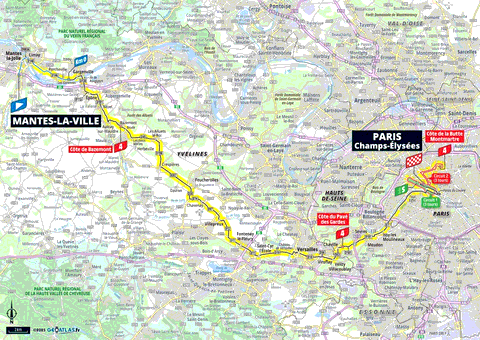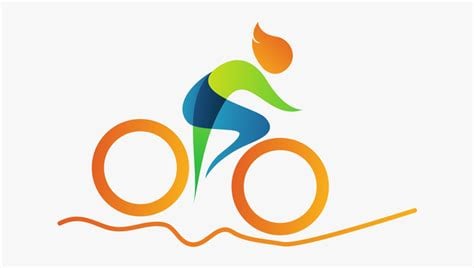Sunday 27: 16:10–16:25 → 19:25–19:45
NB : today, the women stage will finish one hour before the men stage starts.


The Tour is back in Paris, but for the first time, a climb up Montmartre is included in the Champs Élysées loop.
Ruling point (art. 20.b): if it is/starts raining, the times are taken on the first/subsequent passage over the finish ligne.
Thanks for all the race threads over the last weeks!
What are your feelings about this tour?
As far as I am concerned, I rather liked it.
The mountain stages were somewhat disappointing, but aren’t they almost always so? (Except 1 recent year when Pogatchar and Vingegaard were knocking up attacks from outer space.). Vingegaard couldn’t do anything against Pogatchar and Pogatchar behaved weirdly once he had asserted his domination on the first two Pyrénées stages (mass start and TT). Mont Ventoux stage was however a positive surprise, we can note it is also the only one when the leaders’ peloton allowed the breakaway a sufficient time gap, so we could have two separated levels of racing.
Then there were 5 sprint stages. For me, these are absolutely useless, but there have a few vocal fans. I think that they are more than useless: detrimental. They may be the main cause of the withdrawal of important riders, not to mention those who didn’t abandon but were diminished. Ganna (!), Bisseger and Van den berg as soon as the 1st stage; Philipsen and Jeannière on the 3rd; Zimmermann and Wærenskjold on the 9th; Barthe and C. Rodriguez on the 17th.
Punchers stage were OK. Good but stereotyped: I would like to see more open stages, like the last before Paris, or Carcassonne and perhaps Toulouse, where punchers can shine, but also tough all-terrain breakawaymen/classicmen and possibly a couple of all-terrain sprinters. Note: the Mûr de Bretagne stage was the main cause for withdrawals after the sprinters stages. When the stage has a strong puncher stereotype (the Flèche Wallone sterotype, if you want), the unfolding is too similar to a sprinter stage: most of the stage is relatively slow, boring in the peloton (which can also cause crashes), and then the final is super fast and tense.
Paris stage was a good surprise. Although I may not have said this if Pogatchar had won (nevertheless, I must congratulate him for trying, he didn’t need to), or if there had been a crash. They were on a razor’s edge, in spite of being more careful than usual. I wish the organiser could find a less risky way of going downhill, but that’s probably not possible.
Side classifications were rather disappointing. With the withdrawal of the two Alpecin riders, Pogatchar could have won it if he wished so. Milan did want his jersey and did what he could for it, but in a way he only got it thanks to Pogatchar AND other teams handing it to him.
There were few riders interested in the mountain jersey. L. Martinez was the most interested, but he failed badly at it: very bad tactics, random legs, cheating; that’s a bad mix. Woods tried a bit, Arensman perhaps but he was lucky to get two wins on the top. Most the time, the jersey was worn by someone who didn’t want it… The scale and the distribution of passes (mountain stages in the tour and passes within mountain stages) didn’t help, but the problem is deeper.
On the French side, Jegat and Vauquelin were unexpected in the top-10 (even though the gaps are terrible). They put up a good fight everyday (often in the background, so they are lucky that it was the tour of France filmed by French TV and we could follow their struggle), and despite those daily efforts, they were again at the front of the race on the last Saturday (Jegat) and Sunday (Vauquelin)! Stage-wise, V. Paret-peintre saved the honour on the Mont Ventoux; other than that the appraisal for France is awful: a single stage podium with Alaphilippe (Carcassonne). If we consider that best French riders are almost only punchers and it was a tour for punchers, that’s terrible.
Paris stage was a good surprise. Although I may not have said this if Pogatchar had won (nevertheless, I must congratulate him for trying, he didn’t need to), or if there had been a crash. They were on a razor’s edge, in spite of being more careful than usual. I wish the organiser could find a less risky way of going downhill, but that’s probably not possible.
Looking at maps and Google Streetview, the chosen downhill path is the most straightforward, and the easiest too. It actually looks much safer than when it is filmed by a camera just ahead of riders. The curves don’t look as bad as on TV. So perhaps just put a few big & high protections like those they started putting in places like the curves of the descents of the Cipressa and the Poggio on Milan–San-Remo, and it should be OK.
I agree with most of your points. This year’s Tour was less exciting than last year’s, but 2024 was also one of the greatest I can remember (so many amazing narratives) so that was to be expected. There were some strong individual stages this year but every jersey suffered from a disappointing lack of competition (except maybe the white jersey) and that did suck some of the excitement out of the race. Some of that is just the way cycling goes (Pogacar too strong in Yellow, top sprinters crashing out or suffering bad luck leaving Milan unopposed) but the KoM jersey seems to be suffering greatly from the strength of the big teams in this current era and maybe needs some changes to liven it up. The pace is so high and the racing so frenetic that I think a lot of the lesser climbers who would possibly be interested in the KoM jersey just don’t have the energy to get themselves into multiple breakaways or stay away long enough to collect more points than the GC leaders. The Australian commentators talk a lot about Storer’s potential to become the first Australian KoM winner, but he doesn’t seem to be particularly interested and I think part of the reason is that it is so much effort and risk compared to trying for a stage win. One of the reasons I love Grand Tours is because of these “race within a race” dynamics across all the different jerseys and it was disappointing that we didn’t really get that this year. It was all about the GC (which was over quite quickly) and stage wins.
One major factor in the fact that it has become harder to get into breakaways, is IMO that most stages were very stereotyped. Out of 18-19 mass start stages: all flat or useless minor hill in the middle of the stage ⇒ sprinters (5 stages), flat(-ish) + 2-3 steep hills in the end ⇒ punchers (3-4 stages), mountain with a final hard climb ⇒ pure climbers/leaders (5 stages). So that leaves 5 open stages where everyone and their grandmother will attempt to go on a breakaway, creating a very tough concurrence.
On the other hand, it should mean that it is easier to get into breakaways on many stages where everyone believes breakaways have zero chances to win. Therefore, spraying a few generously categorised climbs here and there, and changing the points scale to something that looks more like the one of the Giro d’Italia, should fix the problem. Well… fix that problem, but we could see sprinters in a breakaway on the Giro who weren’t interested in intermediate sprints, despite the fact that the Giro has more intermediate sprints than the Tour, and that it has a special intermediate sprints extra classification (the Giro has many more secondary/tertiary goals than the Tour).
In this year mountain classification, despite the final climbs bringing in many points to GC leaders, the gaps are narrow in the final classification. I think that riders like L. Martinez made a mistake in neglecting small points and just going all in on a few hard mountain stages (to be honest, Martinez tried in the first part of the race too, that’s in the other parts that he gave up on small points). Yes, the crappy scale gives 20 times more points for an HC than for a 4^th cat. climb, and it gives points to many riders compared to one single rider; and there were too many HCs. Yet, even with this crappy scale, L. Martinez would be ranked 2nd, just 14 points below Pogatchar if he hadn’t cheated. That’s for example the exact number of points which was available in the last two stages, which were not mountain stages.
One strange thing is that riders still seem to only give consideration to the first place of those classifications, despite UCI now granting points to the 3 ‘podium’ places in those, and not just for the 1st place. Well, I don’t know: for the green jersey, Turgis and Abrahamsen kept on scoring points until the end, despite being ranked 5th or 6th or 7th… Was it like a parade to them? Did they hope several guys from the podium would abandon? Did they believe there was a separate Intermediate Sprint classification as on the Tour of Italy? 😀
One strange thing is that riders still seem to only give consideration to the first place of those classifications, despite UCI now granting points to the 3 ‘podium’ places in those, and not just for the 1st place. Well, I don’t know: for the green jersey, Turgis and Abrahamsen kept on scoring points until the end, despite being ranked 5th or 6th or 7th… Was it like a parade to them? Did they hope several guys from the podium would abandon? Did they believe there was a separate Intermediate Sprint classification as on the Tour of Italy? 😀
I recall reading somewhere that there used to be small amounts of prize money allocated for minor positions in the sprints, which is part of the reason riders would contest them even when there was no tactical reason to do so. I’m not sure if that’s still the case, but I do wonder if there are other factors like that at play. The riders you mentioned are both from smaller teams, so maybe the outside chance of their team earning a small amount of points or money is worth it for them. This also explains why Coquard is always contesting those sprints despite never being close to winning them or the Green Jersey.
Ah yeah, the barbecue budget (prize money). Here they are:
Each Intermediate sprints:
- 1st – 1500 €
- 2nd – 1000 €
- 3rd – 500 €
Mountain:
- HC:
- 1st – 800 €
- 2nd – 450 €
- 3rd – 300 €
- 1st cat.:
- 1st – 650 €
- 2nd – 400 €
- 3rd – 150 €
- 2nd cat.:
- 1st – 500 €
- 2nd – 250 €
- 3rd cat.:
- 1st – 300 €
- 4th cat.:
- 1st – 200 €
There’s a bit of money at the end, beyond the jersey and the UCI points for the first 3, even though it drops sharply between the podium and the 4thplace.
Points classification (mountain is the same):
- 25,000 €
- 15,000 €
- 10,000 €
- 4,000 €
- 3,500 €
- 3,000 €
- 2,500 €
- 2,000 €
So basically, when they are stuck in such rankings, they only fight for 500 € extra. But yeah, scoring the daily 500 € and paying attention not to fall beyond the 8th place is worth the small effort.
Concerning Coquard, there is that, but I think there are also two other factors.
I think that in the beginning he always goes for the green jersey or at least the point classification podium in the long run, in the hope that other sprinters will abandon; and they often do, as they are more often involved and crashes, and have more trouble going through the mountain. Unfortunately for him, this last point is less and less true, as nobody is kicked out by delays any more.
The last factor is that he is a bit old-school, in the sense that he tries to give his best all the time, he ‘grinds’; even though he knows that his best doesn’t allow him much hope any more, it can be seen as some professional conscientiousness as well (especially in the context of his team).
Great race and great winner, today and the whole tour. I sure like this new route for the final stage
I secretly hope TP will let Jonas win 1 fucking stage today but I know it will be a sprinter.
Ben Healy (🇮🇪 EF) got the Super-Combative title. The official rules state that it is only selected by the jury “at the end of the Tour de France”. So apparently the Tour ended this morning… 🧐 😠
This was the most surprising thing to me, when I first watched le tour (they don’t compete on the last day). I was like, if you could move up in the GC, why not?
Now I get it, TBC.
Usually you can, it was just that the flat terrain and sprint teams made it near impossible to gain any meaningful time. As a result, it was considered a bit of an unwritten rule that you don’t attack and respect the results of the last 20 days of racing. This year the time gaps were neutralised on Montmartre because of the wet conditions (pre-race safety rule).



